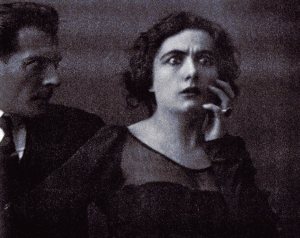LA DONNA CHE INVENTÒ LA DIVA
Maria Grazia Giovanelli (IT 1968)
Francesca Bertini (1892-1985) made her first television appearance, a long one, in 1968, on a special edition of the RAI Almanacco programme by Maria Grazia Giovanelli. She entered in true silent style: “I’m not used to this,” she said to the technician who was adjusting her microphone. Naïvety, or a cunning director’s choice of words? Alternating in tone between the innocent and the formal, her dense interview paints a rich, intense portrait of the Diva par excellence, recounting in her own words a career which started with a childhood debut in Trovatore (leaving aside the 150 metres of La dea del mare), when she “knew nothing of the cinema”, to its apex in 1920: “I was making three million a year” – a record for the time.
Presented at the 1968 Venice Film Festival, the film was broadcast just once on television, and then was in competition in the 9th edition of the “Premio dei Colli per l’inchiesta filmata” (investigative film awards) in Este, near Padua. Rediscovered there by the association La Medusa and restored, it has now been given to Cinemazero under the festival rubric “Le voci dell’Inchiesta” (“Investigative Voices”) and returns to public view. Apart from a few excerpts broadcast on television in 1969 when she appeared on a special episode of the TV series Ieri e oggi (Yesterday and Today), in a lively conversation with Lelio Luttazzi, the complete version of the film disappeared from the airwaves. And, apart from the odd cameo, so did Bertini. To see her “behind the scenes”, audiences had to wait until Gianfranco Mingozzi’s monumental L’ultima diva (1982).
“Television vérité, filmed live”, it was called at the time. The most intriguing parts of Giovanelli’s film are the unrehearsed shots in the gaps between interviews, revealing Bertini’s strength as an actress. She orders, acts, controls the shooting: “Show them, I haven’t become a whale yet,” she shouts. Then, filmed by more cameras, on the habitual stage of the Grand Hotel – her Roman “home” – the memories come thick and fast: the success of Assunta Spina, and many others. The death in Fedora, her favourite film, and the peak of her career: “Eleonora Duse was so moved by it that she wanted to meet me right away”. She claims her role in cinema history: “I had cinema inside me, I created cinema fever, I invented cinema fashion.” She explains her much-publicized refusal of a Hollywood contract – she wanted to be a wife, above everything. At which point she complains: “Don’t make me talk too much, though,” but then wants the interviewer to act too – she strikes a pose and waits for the clapperboard, grandly theatrical. She reaffirms “Bertini’s law”, just as she defined it: on the set she decides what happens.
The interview is punctuated by some excerpts from her films and the deliciously ironic Una giornata di Francesca Bertini (Bertini Film/Caesar Film).
Her 1969 autobiography (evidently that was a time when she felt the need to tell her story) is entitled Il resto non conta (Nothing Else Matters). By contrast, here in this television gem, what matters is the “else” – what happens outside the interview, the look of the deity on the set – which also bears witness to her great expressive force.
Riccardo Costantini

regia/dir: Maria Grazia Giovanelli.
cast: Francesca Bertini.
prod: RAI.
copia/copy: DCP, 22′; sd., dial: ITA.
fonte/source: Cinemazero, Pordenone.


 Italiano
Italiano